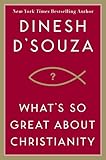

At the end of part 4, D'Souza promises to supply some scientific evidence of the existence of God.
In part 5, he promises to share some "startling developments" in science in the last 100 years which support belief in God.
He offers two of these,
The first of these startling discoveries is the big bang. D'Souza argues that:
- Augustine said that time was created by God at the beginning of creation.
- Modern science says that time began, along with space and matter, at the moment of the big bang.
- This shows that science confirms theology, and therefore supports the existence of God.
This is the first piece of scientific rhetoric D'Souza offers.
Unfortunately, there are several problems with the third point.
-
The fact that one discovery of modern science agrees with one statement of a theologian is hardly evidence that science confirms theology. Augustine, and other theologians, have said a great many things over the ages. Modern science agrees with some, disagrees with others, and has no bearing on many more.
What D'Souza does here is cherry-pick a single statement—out of all the possible statements made by theologians, over the ages—that seems to fit with a modern scientific world-view, and conveniently ignore all the others. - There were, in fact, theologians who said that time had no beginning, and that the universe had always existed. D'Souza, of course, does not mention them.
- Even if we accepted this single example as somehow confirming theological pronouncements on matters of physics, it would still not be evidence that theologians could be trusted on matters of metaphysics, such as the existence of God.
This last mistake is one that D'Souza makes straight through the debate. He can never seem to separate questions like "are there good things about religion" from a question like "does God exist". So, in this case he seems to think that finding one statement by a theologian confirmed by science is evidence for the existence of God.
This is another common mistake in our culture, which is reflected in this debate.
The second "startling discovery" that he offers has to do with nature of the structure of the universe, and basic values of physics. It runs like this:
- There are a set of constants that are inherent to the structure of our universe: things like the mass of electrons, the speed of light, etc.
- If any of the constants were different, even in a small way, we (life as we know it, including humans) could never have evolved.
- Since there are a very large, if not infinite, number of possible values for all these constants, the fact that they are exactly right for us to exist is very improbable.
- The simplest way to account for this very improbable state of affairs is to assume the existence of a God, who intentionally set those constants in order to create a world that would produce us.
There are several problems with the above chain of reasoning, but the central one is the idea that it makes sense to talk about the probability of an event after it has happened.
This is a well-understood error, probably best explained by Richard Feynman. (I haven't been able to verify this, but I'm pretty sure his explanation can be found in The Pleasure of Finding Things Out and the Meaning of It All—a book that everyone should own, anyway).
One way to see this is to think of a deck of playing cards. Suppose I wrote down an order for the cards at random—ace of hearts, three of clubs, king of hearts, nine of spades, etc. It would then make sense to talk about how probable it is that the deck of cards in my game drawer would turn out to be in the same order.
The probability can actually be calculated. It's 1/52!, which is a truly small number. The odds against it happening are phenomenal.
If I were to go to my game drawer, open the deck, and find the cards in exactly the order I wrote down, it would be remarkable—so remarkable that I would be justified in looking for some reason to explain it.
In fact, it would be so remarkable that you already know I am describing something that didn't really happen.
Suppose now that instead I go to my game drawer, and pull out the cards, and then I write down, not some order I made up, but the actual order the cards happen to be in when I open the box.
What is the probability that the list matches the cards in the box now? It's 100%, and there's no mystery involved.
There are still fifty-two cards. I can still make the same calculation. But now it's meaningless.
If I showed the deck to you and told you how amazingly improbable it was that the cards happened to be in exactly this order, given all the other possibilities, you would think I was crazy.
The cards, after all, had to be in some order.
And the universe we live in had to have some combination of constants. Because it has the combination it has, we evolved. There is nothing improbable about this, nothing to explain,
D'Souza's "startling discoveries" of science turn out not to address the question of the debate, after all.
This leads me to question whether they were actually scientific rhetoric at all. It's quite possible that they were political rhetoric, disguised as scientific—intended to give a flavor of scientific respectability to D'Souza'a argument only. It's impossible to know for sure, because we can't see into D'Souza's mind, and because it isn't clear whether he would know, for certain, himself.
He next offers two philosophical arguments, which I'll analyze next time.






